Machine learning and artificial intelligence have emerged as game-changers in the field of healthcare, offering unprecedented opportunities for improving diagnostics, treatments, and patient outcomes. With the ability to analyze vast amounts of data and identify patterns, machine learning algorithms can help healthcare professionals make more accurate diagnoses and develop targeted treatment plans. The integration of machine learning with healthcare is transforming the industry, paving the way for personalized medicine, enhanced patient care, and operational efficiencies.
In this article, we will explore the future prospects of machine learning (ML) in healthcare and its impact on various aspects of the healthcare industry. From its revolutionizing applications in healthcare innovation to its role in improving healthcare outcomes, we will delve into the potential of this technology to revolutionize patient care. Additionally, we will examine the challenges and solutions in implementing machine learning algorithms in electronic health record (EHR) systems and their implications for healthcare professional roles. We will also explore how machine learning is reshaping clinical decision-making and its impact on healthcare organizations in terms of operational efficiencies and cost reduction. Furthermore, we will take a deeper look into the applications of deep learning in medical imaging and the role of machine learning in pharmaceutical innovations.
Key Takeaways:
- Machine learning (ML) has the potential to revolutionize diagnostics, treatments, and patient outcomes in healthcare.
- Machine learning algorithms analyze vast amounts of data to aid healthcare professionals in making accurate diagnoses and developing targeted treatment plans.
- The integration of machine learning with healthcare opens up possibilities for personalized medicine, enhanced patient care, and operational efficiencies.
- Implementing machine learning in electronic health record (EHR) systems presents challenges in data standardization, privacy, and integration.
- Machine learning is reshaping clinical decision-making and has the potential to reduce healthcare costs and improve operational efficiencies in healthcare organizations.
- Deep learning is revolutionizing medical imaging, while machine learning accelerates the drug discovery process and optimizes clinical trial designs.
The Future of Machine Learning for Healthcare
How Is Machine Learning Used in Healthcare Innovation?
Machine learning is at the forefront of healthcare innovation, driving advancements across various areas within the industry. By analyzing vast amounts of data, machine learning algorithms can uncover patterns and insights that can enhance diagnostics, personalize treatment plans, improve patient care, and support research and development.
One of the key machine learning applications in healthcare innovation is in diagnostics. Machine learning algorithms can analyze medical images, such as X-rays or MRIs, to detect and identify diseases with high accuracy. This not only speeds up the diagnosis process but also improves the chances of early detection and treatment.
“Machine learning algorithms can uncover patterns and insights that can enhance diagnostics, personalize treatment plans, improve patient care, and support research and development.”
Additionally, machine learning is revolutionizing personalized medicine. By leveraging patient data, including electronic health records, genetic information, and lifestyle factors, machine learning algorithms can develop personalized treatment plans that take into account individual characteristics and medical history. This targeted approach can lead to better treatment outcomes and improved patient satisfaction.
Machine learning is also driving innovation in patient care. By analyzing real-time patient data, machine learning algorithms can provide healthcare providers with insights and recommendations for improving care delivery. This can range from predicting patient deterioration and preventing adverse events to optimizing resource allocation and streamlining workflows.
How Machine Learning Is Shaping the Future of AI in Healthcare Delivery
Machine learning is shaping the future of AI in healthcare delivery by enabling more precise diagnoses, better treatment recommendations, and improved patient outcomes. With the ability to process and analyze large datasets, machine learning algorithms can identify subtle patterns and trends that may not be discernible to human clinicians.
This level of insight allows for more accurate diagnoses, reducing the chances of misdiagnosis and unnecessary treatments. Machine learning algorithms can analyze multiple data points, including medical history, symptoms, biomarkers, and genetic data, to provide a comprehensive and holistic assessment of a patient’s condition.
Furthermore, machine learning algorithms can generate treatment recommendations based on evidence-based practices and real-world data. This can help healthcare providers make more informed decisions and tailor treatment plans to each patient’s specific needs and preferences.
Overall, the future of machine learning in health care is promising. With ongoing advancements and innovation, machine learning has the potential to revolutionize healthcare delivery, improve patient outcomes, and pave the way for a more personalized, efficient, and effective healthcare system.
Benefits of Machine Learning in Healthcare Outcomes
Machine learning holds immense promise in improving healthcare outcomes, impacting diagnosis accuracy and treatment efficiency. By harnessing the power of machine learning algorithms, healthcare professionals can enhance their ability to make accurate diagnoses and develop targeted treatment plans.
Improving Diagnosis Accuracy and Treatment Efficiency
Machine learning algorithms have the unique ability to analyze vast amounts of data and identify patterns and trends that may go unnoticed by human clinicians. This technology can assist healthcare professionals in accurately diagnosing diseases and conditions, minimizing diagnostic errors, and improving patient outcomes.
Additionally, machine learning enables the development of personalized treatment plans based on individual patient characteristics, medical history, and response to previous interventions. By considering a multitude of factors and leveraging predictive analytics, machine learning algorithms can optimize treatment strategies, leading to improved treatment outcomes and more efficient use of healthcare resources.
Machine Learning for Predictive Analytics in Patient Care
One of the key advantages of machine learning in healthcare is its ability to leverage predictive analytics to improve patient care. By analyzing large datasets and identifying risk factors and patterns early on, machine learning algorithms can enable proactive intervention and preventive measures.
For example, machine learning algorithms can analyze patient data to identify individuals at higher risk of developing certain health conditions, such as diabetes or cardiovascular disease. This allows healthcare providers to implement targeted preventive measures and lifestyle interventions to mitigate the risk and improve long-term outcomes.
Furthermore, machine learning algorithms can predict the likelihood of adverse events or complications, such as hospital readmissions or medication side effects. By identifying patients at higher risk, healthcare professionals can intervene proactively, ensuring timely interventions and preventing avoidable healthcare utilization.
Overall, the application of machine learning in healthcare enables better diagnostic accuracy, more efficient treatment plans, and the implementation of proactive interventions through predictive analytics. By harnessing the power of machine learning, healthcare providers can improve patient outcomes and deliver more effective and personalized care.
| Benefit | Description |
|---|---|
| Enhanced Diagnosis Accuracy | Machine learning algorithms can identify subtle patterns and indicators in patient data, aiding in accurate and timely diagnoses. |
| Optimized Treatment Plans | Machine learning algorithms can analyze patient characteristics, medical history, and treatment responses to develop personalized and efficient treatment strategies. |
| Proactive Intervention | By leveraging predictive analytics, machine learning algorithms can predict and identify patients at higher risk of adverse events, enabling proactive interventions and preventive measures. |
| Improved Resource Utilization | Machine learning algorithms can optimize resource allocation, ensuring efficient use of healthcare resources and reducing unnecessary healthcare utilization. |
Machine Learning Algorithms: The Backbone of Modern EHR Systems
Machine learning algorithms play a vital role in modern electronic health record (EHR) systems, serving as the backbone that enables efficient data management, analysis, and decision-making. These sophisticated algorithms can process vast amounts of data and extract meaningful insights, revolutionizing the way healthcare providers utilize and leverage EHRs.
EHR Systems and ML: A Symbiotic Relationship
EHR systems and machine learning have developed a symbiotic relationship, where the power of machine learning algorithms relies on the abundance of data stored within EHRs. The integration of machine learning into EHR systems allows for more accurate diagnoses, improved treatment recommendations, and enhanced patient outcomes.
By leveraging machine learning algorithms, healthcare professionals can uncover patterns, trends, and correlations in patient data that may not be discernible through traditional analysis methods. These insights can lead to more personalized and effective healthcare interventions, ultimately improving patient care and outcomes.

Challenges and Solutions in Implementing ML in EHR
While the integration of machine learning in EHR systems offers tremendous potential, it also presents challenges that need to be addressed to ensure its effective implementation. Some of the key challenges include:
- Data Standardization: EHR data often comes from different sources and may have inconsistencies in structure and format. Standardizing the data to ensure compatibility and interoperability is crucial for machine learning algorithms.
- Privacy Concerns: The sensitive nature of health data raises concerns about privacy and security. Implementing robust privacy protocols and ensuring compliance with data protection regulations is essential when utilizing machine learning in EHR systems.
- Integration with Existing Systems: Seamless integration of machine learning algorithms with existing EHR systems can be a complex process. It requires careful planning and coordination to ensure compatibility and minimal disruption to healthcare workflows.
To overcome these challenges, collaboration between healthcare providers, data scientists, and technology experts is crucial. Developing and implementing standardized data models, adopting privacy-enhancing techniques, and leveraging interoperability standards are some of the proposed solutions to facilitate the successful implementation of machine learning in EHR systems.
Challenges and Solutions in Implementing ML in EHR
| Challenges | Solutions |
|---|---|
| Data Standardization | Develop standardized data models and interoperability standards. |
| Privacy Concerns | Implement robust privacy protocols and adhere to data protection regulations. |
| Integration with Existing Systems | Plan and coordinate the seamless integration of machine learning algorithms with EHR systems. |
The implementation of machine learning in EHR systems requires a comprehensive approach that addresses these challenges while maximizing the benefits of these advanced algorithms. As the healthcare industry continues to evolve, the integration of machine learning in EHR systems holds tremendous promise in enabling evidence-based decision-making, enhancing patient care, and improving overall healthcare outcomes.
Revolutionizing Patient Care with Learning Models
Machine learning is transforming patient care through the development and application of learning models. These models have the potential to revolutionize healthcare by delivering personalized medicine and improving diagnostics and treatments. Furthermore, machine learning algorithms are reshaping the fields of radiology and pathology, enhancing the accuracy and efficiency of disease detection and diagnosis.
Personalized Medicine Through Machine Learning
One of the most significant advancements in healthcare is the ability to deliver personalized medicine using machine learning. By analyzing vast amounts of patient data, machine learning models can identify patterns, predict outcomes, and recommend tailored treatment plans based on an individual’s unique characteristics and medical history. This personalized approach not only improves patient outcomes but also enhances patient satisfaction and reduces healthcare costs.
Deep Learning in Radiology and Pathology
Deep learning algorithms are revolutionizing the fields of radiology and pathology. In radiology, these algorithms can analyze medical images with a level of accuracy and precision that rivals or exceeds human performance. This capability allows for earlier and more accurate detection of diseases, leading to improved patient outcomes. In pathology, deep learning algorithms can assist pathologists in identifying and classifying tissue samples, streamlining the diagnostic process, and ensuring more accurate diagnoses.
Through the application of machine learning in radiology and pathology, healthcare providers can improve the speed and accuracy of disease detection and diagnosis, leading to more effective treatments and better patient care. These advancements have the potential to significantly revolutionize patient care in the healthcare industry.
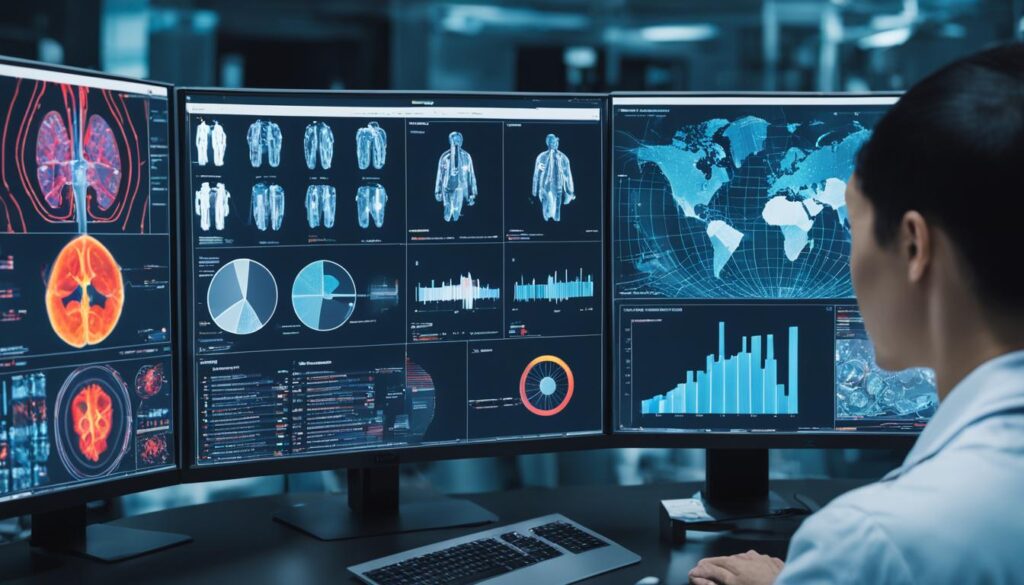
Machine learning is revolutionizing patient care through the development and application of learning models. These models have the potential to deliver personalized medicine by tailoring treatments to individual patients based on their unique characteristics and medical history. Additionally, deep learning algorithms are being used in radiology and pathology to enhance the detection and diagnosis of diseases, improving the accuracy and efficiency of these medical imaging fields.
AI’s Impact on Healthcare Professional Roles
The integration of AI and machine learning in the healthcare industry is transforming the roles and responsibilities of healthcare professionals. While AI has the potential to automate certain tasks and augment the capabilities of healthcare professionals, it is not expected to replace them entirely. Instead, AI is reshaping the roles by enabling healthcare professionals to focus on more complex and strategic aspects of patient care.
The adoption of AI technologies in healthcare is streamlining processes, enhancing efficiency, and improving patient outcomes. AI-powered solutions can automate administrative tasks, streamline workflows, and improve resource allocation, allowing healthcare professionals to dedicate more time to direct patient care and critical decision-making.
AI is revolutionizing healthcare professional roles in several key areas:
- Medical Data Analysis: With the ability to process and analyze vast amounts of patient data, AI algorithms can assist healthcare professionals in identifying patterns, predicting outcomes, and making more accurate diagnoses. This enables healthcare professionals to focus on interpreting the results and developing personalized treatment plans based on AI-generated insights.
- Diagnostic Support: AI-powered diagnostic tools can assist healthcare professionals by providing real-time analysis of medical images, pathology slides, and other diagnostic data. These tools can help detect abnormalities, identify early signs of diseases, and support healthcare professionals in making more informed and timely decisions.
- Virtual Assistants: AI-powered virtual assistants can handle administrative tasks, such as appointment scheduling and patient inquiries, allowing healthcare professionals to prioritize direct patient care. These virtual assistants can also provide patients with personalized health information and reminders, promoting self-care and patient engagement.
- Decision Support Systems: AI-powered decision support systems can analyze patient data in real-time and provide healthcare professionals with evidence-based recommendations for treatment plans, medication choices, and interventions. By leveraging AI-generated insights, healthcare professionals can make more informed decisions and improve patient outcomes.
The impact of artificial intelligence (AI) on healthcare professional roles extends beyond direct patient care. It also enhances collaboration among healthcare professionals, facilitates knowledge sharing, and promotes continuous learning. As AI technology continues to advance, healthcare professionals need to adapt their skills and embrace new opportunities for interdisciplinary collaboration to fully harness the benefits offered by artificial intelligence in healthcare.

Artificial Intelligence as a Tool for Enhanced Decision-Making
Artificial intelligence (AI) is revolutionizing decision-making in healthcare by leveraging advanced algorithms and data analytics. These AI-powered systems are integrated with electronic health records (EHRs) to provide valuable insights and support clinical decision-making. By combining the vast amount of patient data stored in EHRs with the analytical capabilities of AI, healthcare providers can make more informed decisions and improve patient outcomes.
One of the key areas where AI is transforming decision-making is in the integration with EHRs. EHRs contain comprehensive patient information, including medical history, test results, medications, and treatment plans. AI algorithms can analyze this data in real-time, identifying patterns, trends, and potential risks that may not be apparent to human clinicians. By integrating AI with EHRs, healthcare professionals can access timely and accurate insights to guide their decision-making process.
Additionally, AI is redefining clinical decision support systems (CDSS), which are tools that provide clinicians with recommendations and insights based on clinical guidelines and evidence-based practices. AI-powered CDSS can analyze patient data, medical literature, and real-time data feeds to deliver personalized recommendations for diagnostics, treatment options, and ongoing care. These systems can also alert healthcare providers to potential drug interactions, adverse reactions, or treatment conflicts, enabling proactive and patient-centered decision-making.
Integrating AI with EHRs and redefining CDSS allows healthcare providers to harness the power of artificial intelligence for decision-making, resulting in more accurate diagnoses, optimized treatment plans, and improved patient outcomes.
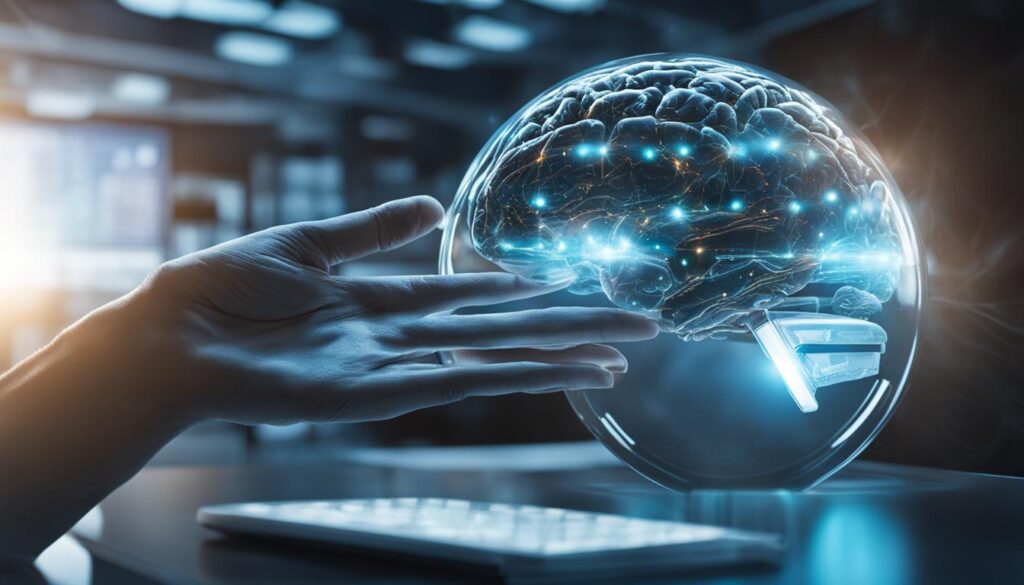
AI Technologies and Their Impact on Healthcare Organizations
The adoption of AI technologies in healthcare organizations has significant implications for operational efficiencies and cost reduction. By harnessing the power of AI, healthcare organizations can streamline their processes, improve resource allocation, and enhance patient care.
Operational Efficiencies Gained Through AI Adoption
“AI-powered solutions have the potential to automate administrative tasks, optimize workflows, and enhance operational efficiencies in healthcare organizations. By leveraging AI technologies, healthcare professionals can focus more on patient care and strategic decision-making.”
AI-powered solutions can automate repetitive and time-consuming tasks such as data entry, documentation, and appointment scheduling, allowing healthcare professionals to allocate their time and energy to more meaningful activities. Additionally, AI algorithms can analyze large volumes of data to identify patterns and trends, supporting healthcare organizations in making data-driven decisions and optimizing resource allocation.
Moreover, AI technologies can enhance communication and collaboration among healthcare teams, enabling real-time information sharing and seamless coordination of care. By automating the process of data collection, AI can also reduce the risk of human errors and improve the accuracy and reliability of healthcare data.
AI’s Role in Reducing Healthcare Costs
“AI technologies have the potential to drive significant cost reductions in healthcare by improving diagnostic accuracy, preventing avoidable readmissions, and optimizing treatment plans.”
AI-powered solutions can improve diagnostic accuracy by analyzing complex medical data, including medical images, lab results, and patient histories. By leveraging machine learning algorithms, healthcare organizations can enhance early detection of diseases and develop more targeted and personalized treatment plans, reducing the need for unnecessary and costly procedures.
Additionally, AI technologies can help identify and mitigate factors that contribute to avoidable readmissions, such as medication non-adherence or inadequate care transitions. By leveraging predictive analytics, AI can identify patients who are at higher risk of readmission, allowing healthcare organizations to intervene proactively and provide targeted interventions to prevent readmission.
Furthermore, AI technologies can optimize treatment plans by considering individual patient characteristics, medical history, and outcomes data. By analyzing vast amounts of data, AI algorithms can identify the most effective treatment options for specific patients, reducing healthcare costs associated with trial-and-error approaches.
The adoption of AI technologies in healthcare organizations holds great promise for enhancing operational efficiencies and reducing healthcare costs. By leveraging AI-powered solutions, healthcare professionals can optimize their workflows, improve patient care, and allocate resources more effectively, ultimately driving better healthcare outcomes.
Deep Learning in Healthcare: A Deeper Look into Medical Imaging
Deep learning, a subset of machine learning, is transforming the field of healthcare, especially in the realm of medical imaging. This powerful technology utilizes deep learning algorithms to analyze complex medical images with unparalleled accuracy and precision. By leveraging deep learning in medical imaging, healthcare professionals can detect and diagnose various diseases more effectively.
One of the key advantages of deep learning in medical imaging is its ability to handle vast amounts of data. This technology can process and interpret medical images such as X-rays, CT scans, and MRIs, allowing for the identification of abnormalities and the early detection of diseases. Deep learning algorithms excel at recognizing patterns and features in medical images, enabling healthcare providers to make more informed decisions and provide accurate diagnoses.
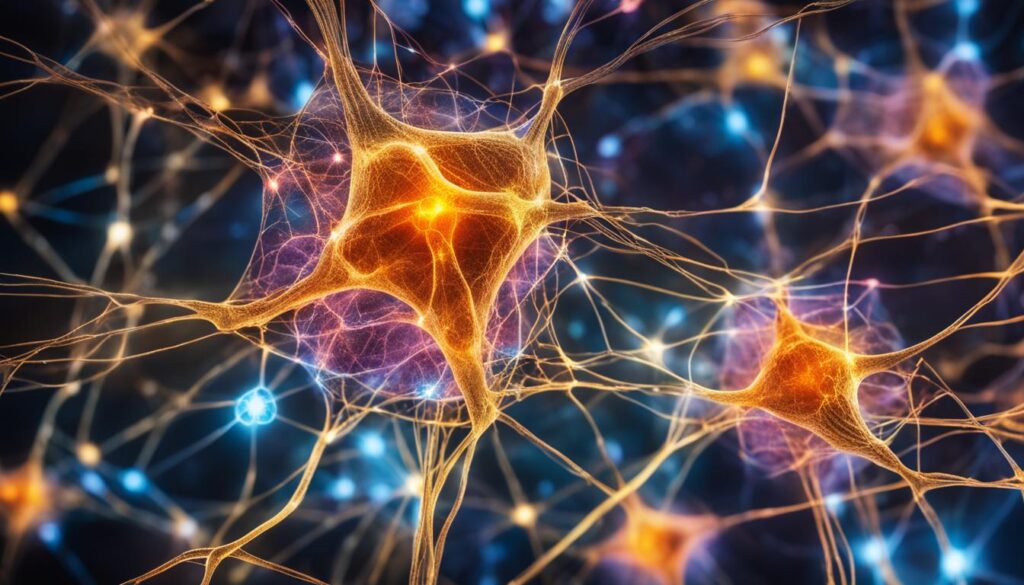
In addition, deep learning in medical imaging has the potential to revolutionize treatment planning and patient care. By accurately analyzing medical images, deep learning algorithms can assist healthcare professionals in developing personalized treatment plans tailored to each patient’s unique condition. This personalized approach improves the precision of interventions and enhances patient outcomes.
The application of deep learning in medical imaging extends beyond diagnostics and treatment planning. It also plays a vital role in research and development, allowing for the analysis of large datasets to gain insights into disease progression and treatment response. With deep learning, researchers can uncover new discoveries and advance medical knowledge, leading to improved healthcare practices and innovations.
In conclusion, deep learning in medical imaging is revolutionizing healthcare by providing healthcare professionals with advanced tools for accurate diagnosis, personalized treatment planning, and research insights. As this technology continues to evolve, its impact on medical imaging and patient care will only continue to grow, leading to improved outcomes and advancements in the field of healthcare.
Application of Machine Learning in Pharmaceutical Innovations
Machine learning is revolutionizing the field of pharmaceutical innovations, enabling advancements in drug discovery and clinical trial design. By harnessing the power of machine learning algorithms to analyze vast amounts of data, pharmaceutical companies can accelerate the drug discovery process and optimize the design of clinical trials.
Drug Discovery Accelerated by Machine Learning
Machine learning algorithms have the ability to identify patterns and extract valuable insights from complex datasets. In the context of drug discovery, machine learning can be used to analyze the characteristics of known drugs, predict their effectiveness against specific targets or diseases, and even identify potential drug candidates with therapeutic potential. By streamlining the drug discovery process, machine learning saves time and resources, bringing new treatments to market more efficiently.
Machine Learning in Clinical Trial Design
Clinical trials are critical for evaluating the safety and efficacy of new drugs. Machine learning algorithms can aid in the design of clinical trials by optimizing factors such as sample size, treatment protocols, and patient selection criteria. By analyzing historical data and predicting patient responses, machine learning can identify the most effective trial design to achieve meaningful results. This not only speeds up the clinical trial process but also enhances the accuracy and reliability of the findings.
In summary, the application of machine learning in pharmaceutical innovations is revolutionizing drug discovery and clinical trial design. By leveraging the power of data analysis and pattern recognition, machine learning algorithms enable pharmaceutical companies to develop new treatments faster and more efficiently. This has the potential to greatly impact the future of healthcare by bringing innovative therapies to patients in need.

Examples of Machine Learning Applications in Clinical Practice
Machine learning applications are transforming clinical practice in various specialties. One notable example is the use of AI in radiology, where machine learning algorithms are augmenting the expertise of radiologists and enhancing the accuracy of medical image interpretation.
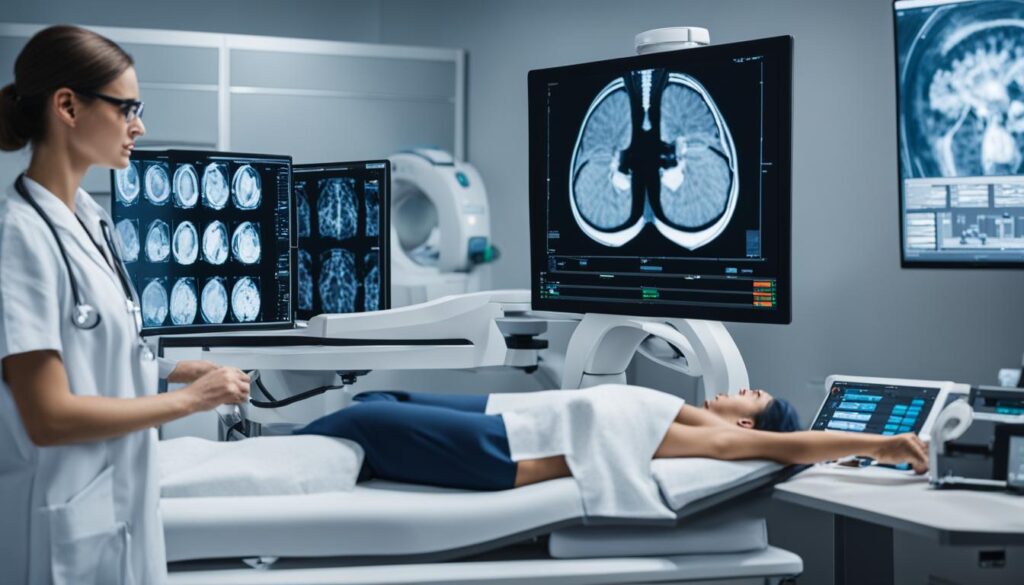
AI in Radiology: Augmenting the Expertise of Radiologists
In the field of radiology, machine learning algorithms are revolutionizing the interpretation of medical images, such as X-rays, MRIs, and CT scans. These algorithms have the ability to analyze large volumes of complex data and identify subtle patterns and abnormalities that may be difficult for human radiologists to detect.
The integration of AI in radiology has the potential to improve diagnostic accuracy, reduce interpretation errors, and expedite patient care. By assisting radiologists in identifying and diagnosing conditions, AI-powered algorithms can enhance the overall precision and efficiency of radiological assessments.
Moreover, machine learning in radiology enables the development of advanced image recognition and segmentation algorithms. These algorithms can automatically identify and outline specific organs, tumors, or abnormalities within medical images, streamlining the process of diagnosis and treatment planning.
In addition, AI tools in radiology can aid radiologists in detecting early signs of diseases, such as lung cancer or breast cancer, leading to earlier interventions and potentially improved patient outcomes. The combination of human expertise and machine learning algorithms allows for more accurate and timely diagnoses, enhancing the quality of healthcare delivery.
Machine Learning in Oncology: Tailoring Cancer Care
Machine learning algorithms are playing a crucial role in oncology, revolutionizing the field of cancer care. By analyzing vast amounts of patient data, including medical records, genetic profiles, and treatment outcomes, machine learning can help oncologists make more informed decisions and tailor treatment plans for individual patients.
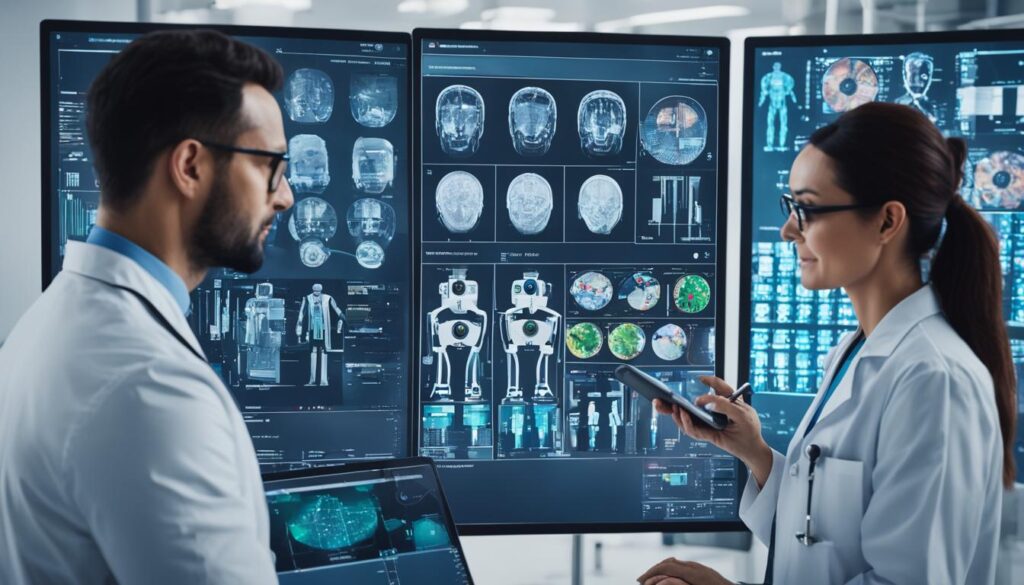
The application of machine learning in oncology enables personalized treatment strategies based on a patient’s unique characteristics and medical history. By analyzing patterns in the data, machine learning algorithms can provide insights into optimal treatment options, potential side effects, and predictions of treatment outcomes, contributing to more effective and targeted cancer care.
Furthermore, machine learning algorithms can assist oncologists in predicting the risk of cancer recurrence, allowing for proactive monitoring and intervention. These algorithms can analyze patient data to identify early signs of cancer recurrence, enabling timely intervention and potentially improving survival rates.
Additionally, machine learning in oncology plays a role in drug discovery and development. By analyzing vast libraries of molecular and genetic data, machine learning algorithms can identify potential drug targets, predict drug efficacy, and accelerate the discovery of novel therapeutic approaches.
Overall, the integration of machine learning in oncology holds great promise for revolutionizing cancer care, enabling more precise diagnoses, personalized treatments, and improved patient outcomes.
Machine Learning and Healthcare: A Look at Current and Potential Ethical Considerations
The integration of machine learning in healthcare has brought about significant advancements and improvements in patient care. However, it also raises important ethical considerations that need to be addressed. These considerations encompass various aspects of machine learning implementation in healthcare, including:
- Privacy and Security of Patient Data: With the use of AI, large amounts of sensitive patient data are collected and analyzed. Ensuring the privacy and security of this data is crucial to maintain patient trust and comply with legal and ethical standards.
- Bias in Machine Learning Algorithms: Machine learning algorithms can inadvertently perpetuate bias if not properly trained and validated. It is important to address biases related to race, gender, and socio-economic factors to ensure fair and equitable healthcare delivery.
- Transparency of AI Decision-Making Processes: AI algorithms can provide valuable insights and recommendations, but the lack of transparency in their decision-making processes raises concerns. Healthcare professionals and patients need to understand the reasoning behind AI-driven decisions to maintain accountability and trust.
- Potential Impact on Patient-Provider Relationships: The integration of AI in healthcare may alter the dynamics of the patient-provider relationship. It is crucial to strike a balance between AI-enabled care and maintaining the human touch in healthcare interactions to ensure patient satisfaction and well-being.
This section will examine the current ethical considerations associated with AI implementation in healthcare and explore potential solutions and best practices to address these issues. By proactively addressing these ethical considerations, we can ensure that AI in healthcare is deployed responsibly and truly benefits patients and healthcare providers alike.

Conclusion
Machine learning is poised to revolutionize the future of healthcare by offering exciting possibilities in diagnostics, treatments, and operational efficiencies. Through its integration with healthcare, it has the potential to transform patient outcomes and enhance healthcare delivery. Machine learning algorithms are being used to improve diagnosis accuracy, optimize treatment efficiency, and enable personalized medicine.
Despite the significant benefits of machine learning in healthcare, ethical considerations must be addressed to ensure responsible implementation. Privacy and security of patient data, bias in algorithms, transparency in decision-making processes, and the impact on patient-provider relationships are important factors that need careful attention.
By harnessing the power of machine learning and prioritizing patient-centric care, the healthcare industry can embrace the potential of AI while navigating the associated ethical challenges. The future of healthcare holds great promise as machine learning continues to reshape and enhance various aspects of the industry. With responsible implementation, machine learning can usher in a new era of healthcare that is more precise, efficient, and patient-focused.
FAQ
How can artificial intelligence and machine learning systems benefit the healthcare industry?
What are the different types of machine learning used in healthcare?
How does the deep learning model contribute to the future of healthcare?
How is machine learning being employed in healthcare institutions?
What are the future prospects of machine learning and deep learning in healthcare?
What are the key considerations for implementing machine learning-based solutions in the healthcare sector?
What role does machine learning play in international conferences on machine learning and healthcare?
How is machine learning transforming healthcare?
What are some applications of machine learning in healthcare?
What is the role of machine learning in healthcare?
How can machine learning improve the healthcare system?
What role does data play in implementing machine learning in health care?
Source Links
- https://www.forbes.com/sites/bernardmarr/2022/09/14/how-ai-and-machine-learning-will-impact-the-future-of-healthcare/?sh=24025c9347e5
- https://www2.deloitte.com/us/en/pages/life-sciences-and-health-care/articles/future-of-artificial-intelligence-in-health-care.html
- https://www.ncbi.nlm.nih.gov/pmc/articles/PMC6616181/

